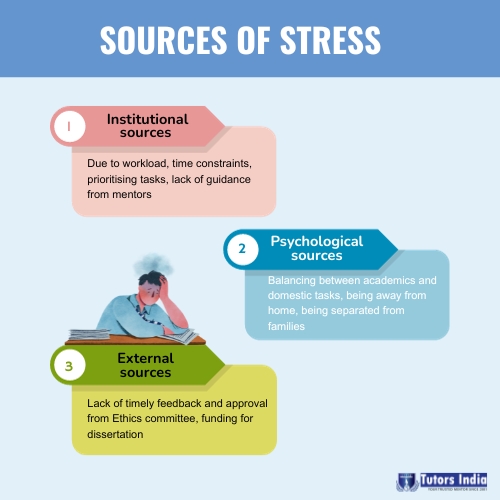Understanding and Managing Academic Stress: A Guide for Master’s Students
Stress among master’s students
Stress is an unavoidable part of everyone’s life. The term ‘stress’ was first coined in 1936 by Hans Selye, who defines it as a ‘non-specific response of the body to any demand for change’. Although stress is a physiological adaptation to threats, stress has positive and negative effects. For some people, stress can lead to better thinking and boost creativity. However, in most cases, stress negatively impacts one’s physical and mental health (Hazarika, 2021).
Master’s students may experience significant levels of stress as a result of competing demands and the rigorous nature of master’s programmes. Master’s students encounter the standard academic constraints of higher education and added professional stressors such as the pressure to publish, teach, and meet their guide’s expectations. Master’s students may ignore their emotional and physical health if pressured to reconcile academic and professional ambitions with outside family and job responsibilities (Allen, 2021).
The following section deals with the causes of stress and ways to overcome it:
Causes of Stress among master’s students
Various studies have been conducted for measuring stress levels among graduate students. However, a qualitative study by Leslie (2021) elaborated on the following sources of stress among health professional graduates:

- Institutional sources of stress: The institutional sources of stress are related to the curriculum and include workload, course, lack of time, instructions given for assignments, delay in posting grades, prioritisation of tasks and perceived non-essential coursework. Students often feel that the workload is very high, they need more time to complete their assignments, and they lack sufficient guidance from their mentors. Students also feel that they lack guidance from their supervisor. This finding is especially true among international students.
- Psychological sources of stress: Students struggled to focus on their academic work because they had domestic tasks at home, and being away from home or separated from their families added to their academic-related stress.
- External factors for stress:The external factors of student stress were related to the lack of timely feedback from the Ethics Committee; the wait time for approval from the Ethics Committee caused stress among students conducting research for their master’s dissertation.In some cases, students needed help funding their research for their master’s dissertation. Some students faced stress about funding a semester or dissertation, leading them to resit it.
Methods to overcome stress
- Engaging in extra-curricular activities: Engaging in outdoor activities like sports and going out with friends helped reduce stress among master’s students. Some students also found engaging in activities like listening to music and distancing themselves from work helpful for reducing stress.
- Relaxation: Relaxation techniques like meditation, spirituality and yoga help students to reduce their stress levels. Effect of relaxation techniques includes sensations of fulfilment, positive emotions, calmness, and relaxation. They encourage self-reflection and improve attention. A study by Paul (2016) revealed that spiritual practices helped students pursuing master’s degree in management reduce academic stress and encourages cultivating spiritual practices among students.
- Seeking support: Students must seek the help of a counsellor when they are feeling stressed. Communicating experiences helps in this regard. Counsellors may offer tips that are helpful for them (Gondo, 2023).
Conclusion
Stress is a physiological reaction to perceived threats. While it may lead to positive effects like improved creativity, it affects students’ physical and mental well-being. Although it is prevalent among master’s students in various specializations, its intensity varies. Students may be stressed on aspects related to coursework and master’s dissertation. Factors contributing to stress could be related to institutions, psychological factors and external factors. Relaxation techniques, engaging in extra-curricular activities and seeking mental health support can help reduce stress.
About Tutors India
We are a team of professional academic writers and researchers who have helped master’s students with their dissertations and coursework. We understand that pursuing a Master’s degree can be stressful, so we offer customized help for students. We assist students at every stage of their coursework and dissertation and ensure that the work aligns with the university guidelines. We also offer numerous study guides and sample works that help students develop a well-structured dissertation and high-quality coursework.
To know more about how a master’s dissertation is written in various fields, check out our dissertation examples.
References
- Hazarika, Dr. (2021). “A Study on The Levels Of Stress Among Post Graduate Students Of Dibrugarh University’’. Psychology and Education Journal. 58. 5897-5907.
- Allen HK, Barrall AL, Vincent KB, Arria AM. Stress and Burnout Among Graduate Students: Moderation by Sleep Duration and Quality. Int J Behav Med. 2021 Feb;28(1):21-28.
- Kadene Leslie, Kimarie Brown, Joyette Aiken, Perceived academic-related sources of stress among graduate nursing students in a Jamaican University, Nurse Education in Practice, Volume 53,2021,103088.
- Gondo, D., Bernardeau-Moreau, D., & Campillo, P. (2023). Student Stress and the Effects of Relaxation: A Study Conducted at the University of Lille in Northern France. Social Sciences, 12(6), 318. MDPI AG. Retrieved from

 Previous Post
Previous Post Next Post
Next Post